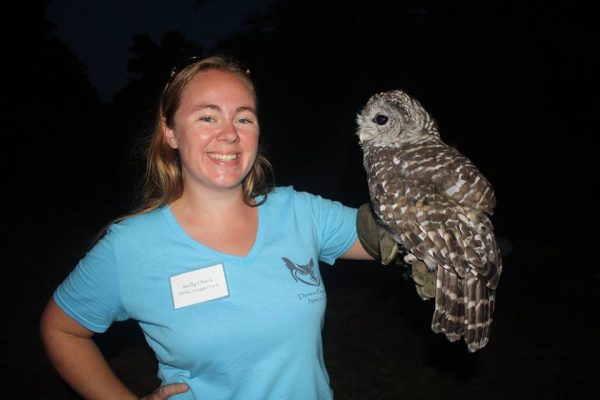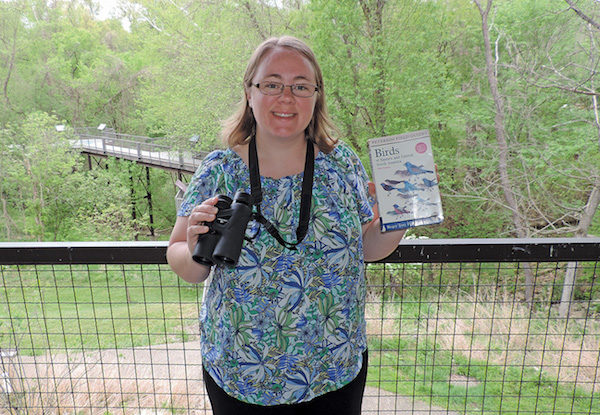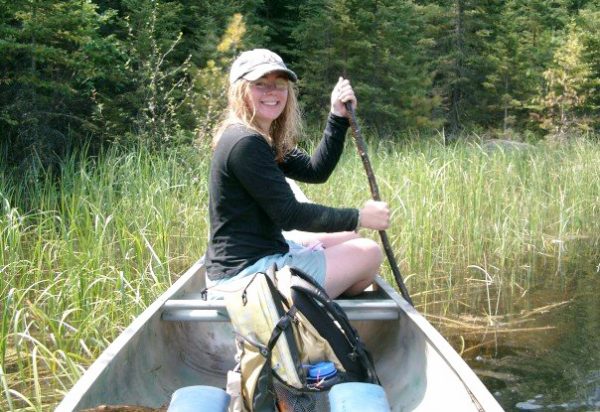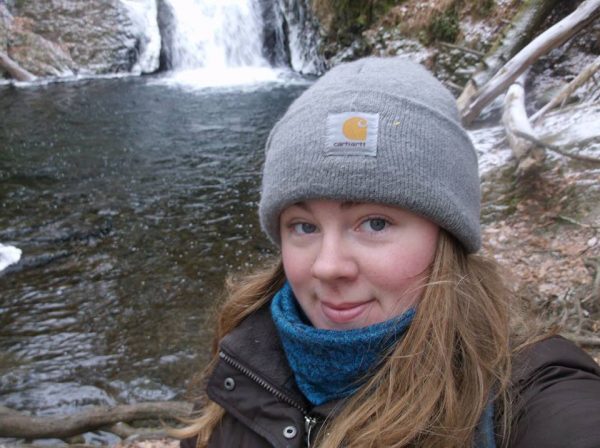WEEasked some simple questions — and your neighbors, friends, co-workers, acquaintances, even some strangers, answered. Get to know them a little bit better with our fun series, “WEEasked.” Look for it a couple of times a month, most likely on Mondays. Do you have someone you’d like to see featured? Send us an email to weelunk@weelunk.com, and please be sure to put WEEasked in the subject line.
If you’ve visited Oglebay Institute’s Schrader Environmental Education Center, you’ve probably met director Molly Check. She’s an educator and naturalist, and she began her tenure at the Schrader Center in April of 2017. Molly is an avid birder, and she’s dedicated her life to environmental education. She works with many of our local schools to teach children about conservation and a love of nature.
“I’ve always worked in non-formal education — nature centers,” she said. “When I went to college, I knew that it needed to be something outside. I signed up for natural resource management. I knew I didn’t really want to be a park ranger. At the end of my junior year, I had an Intro to Environmental Education class requirement. And then that was kind of when the lightbulb went off.”
She worked in Minnesota and Connecticut before coming to the Schrader Center.
My favorite thing about hanging out with a naturalist like Molly is the wealth of knowledge she brings into the woods. Naturalists just seem to know everything about everything. Hear that bird? That’s a red-bellied woodpecker, she’ll tell you. What about that caterpillar? Cecropia moth, she’ll say.
 I took a fungus-identification class with her a few years ago and am proud to say I can now gather Chicken of the Woods without poisoning my entire family. I also know just enough about slime molds to be dangerous at cocktail parties. Seriously, befriend a naturalist. You’ll never be bored.
I took a fungus-identification class with her a few years ago and am proud to say I can now gather Chicken of the Woods without poisoning my entire family. I also know just enough about slime molds to be dangerous at cocktail parties. Seriously, befriend a naturalist. You’ll never be bored.
More importantly, Molly really cares about what she does, and she knows how important her work is. Younger generations face an uncertain future and will need to work hard to effect lasting environmental change. I’m thankful to have Molly leading tomorrow’s leaders out into the woods, where they learn such important lessons.
Here’s what Molly answered when WEEasked:
What’s your favorite nature spot in the Ohio Valley?
Bear Rock Lake Wildlife Management Area, located off the Dallas Pike exit on Interstate 70. There are typically people fishing on the middle pond, but very few people hike the trails. It’s a great place for spring and fall birding, and for wildflowers and other botanical study. I go there quite often to relax and re-energize.
 Tell us something that would surprise Weelunk readers about you.
Tell us something that would surprise Weelunk readers about you.
I was raised without a lot of modern conveniences (we had running water and electricity, but no computer, dishwasher, answering machine, washing machine or dryer), so I tend to value traditional methods and do not always embrace the latest trends. Therefore, despite the overwhelming pressure from society to do so, I do not own a smartphone.
What’s the best part of your job?
My co-workers. I’m so lucky to work with other naturalists and staff who are passionate about the same things that I am passionate about. We have a small staff that works together on so many diverse projects — from exploring our stream for bio-indicator species to researching strategies to teach about climate change, it’s always fun to share ideas and perspectives.
What’s your favorite Wheeling neighborhood and why?
Since moving to the area three years ago, I’ve always been really fond of the Warwood neighborhood. I like the old homes and buildings there, and their community park is a really nice spot to visit.
What book is on your nightstand or e-reader right now?
I’m old school, so paper books only, please. I just finished reading The Sea Runners, by Ivan Doig, an enthralling account of four men and a canoe pitted against the wild Pacific coastline. I’m currently reading Four Fish: the Future of the Last Wild Food, by Paul Greenberg. I just finished the first section, on salmon, and was surprised by how little I really knew about that particular food industry.
 Favorite tree and favorite woodland creature? Why?
Favorite tree and favorite woodland creature? Why?
I get asked about my favorite parts of nature a lot, and considering my rather sizeable love of so many plants and animals, the answers tend to change from time to time. At this moment in my life, my favorite tree is the cottonwood tree in my backyard. I’ve always loved how their flattened stems cause the leaves to shake in the slightest breeze, and I like to sit under it at the end of a long day and watch the leaves shake and blow and sometimes drop slowly to the ground. Favorite woodland creature? This is my year of the coyote, for sure. I’ve seen a handful of them since spring, and sightings of this intelligent and adaptable mammal always leave me feeling grateful for the encounter.
What is your wish for Wheeling?
My wish for Wheeling is the same as my wish for the world — for everyone to be kind to each other, identify common goals that will benefit local communities, and work toward an environmentally sustainable future.
• Laura Jackson Roberts is an environmental writer and humorist in Wheeling, West Virginia. She holds an MFA in Creative Writing from Chatham University and serves as the northern panhandle representative of West Virginia Writers. Her hobbies include hiking, travel and rescuing homeless dogs. Visit her at laurajacksonroberts.com.


